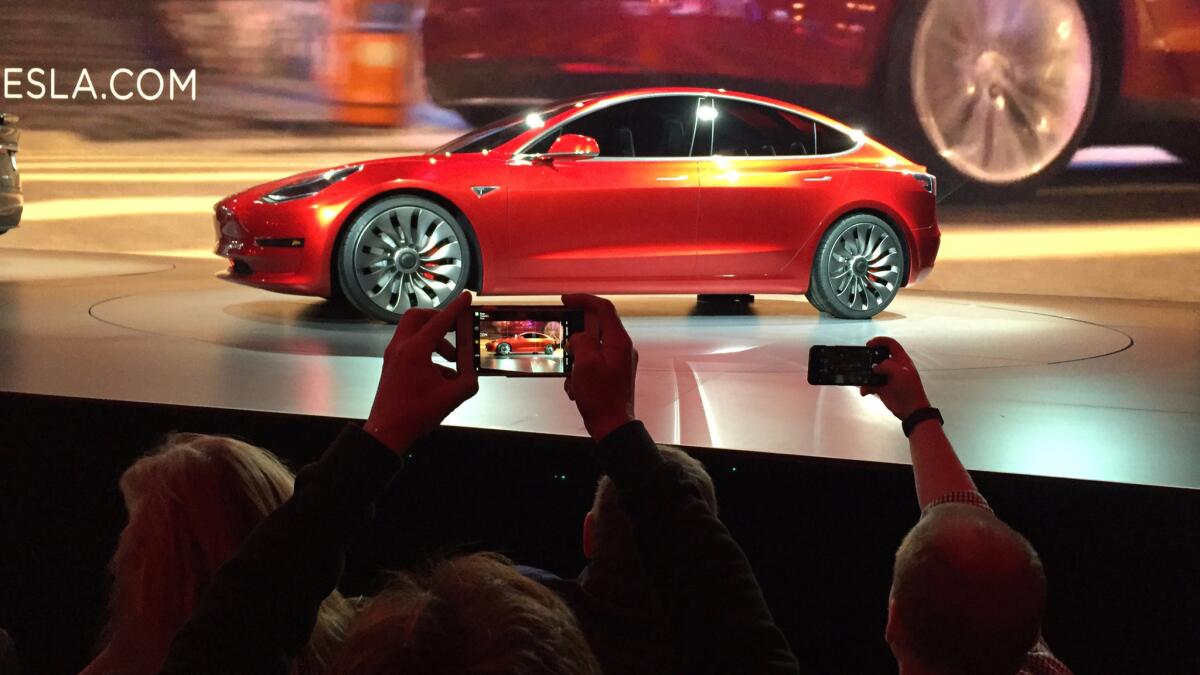Tesla ‘working exclusively’ with Panasonic for Model 3 battery cells, Elon Musk says

Tesla Motors Inc. is working exclusively with Panasonic Corp. for its Model 3 electric car battery cells, Chief Executive Elon Musk said, adding that news stories reporting otherwise were “incorrect.”
Musk made the statement in a tweet Tuesday night. He also said the cells for the higher-end Model S sedan and Model X SUV were by Panasonic too.
Reuters reported Tuesday that Tesla probably would add Samsung SDI as a supplier for the Model 3 if Tesla’s battery plant could not meet demand.
Reuters said a Tesla spokeswoman had responded to its inquires Tuesday by saying the company works with “all leading battery manufacturers around the world” but doesn’t comment on details of the programs with specific suppliers.
In a tweet Wednesday, Musk indicated that Samsung could be involved with Tesla Energy, which is focused on batteries designed to store energy for homes, businesses and utility companies.
A bill of lading shows that a nearly 125-ton shipment of Samsung lithium-ion cells arrived for Tesla at the Port of Oakland in April. A Tesla spokeswoman did not immediately respond to a request for comment.
In the same tweet, Musk confirmed to a Bloomberg reporter that South Korean battery maker LG Chem Ltd. was involved with the Tesla Roadster. News of a contract between LG Chem and Tesla for upgrades to the now-discontinued Roadster was reported in 2015 by the Wall Street Journal.
Tesla said in 2014 that it would partner with Panasonic to build its “gigafactory” battery plant in Sparks, Nev. The companies said at the time that Panasonic would manufacture and supply cylindrical lithium-ion cells and also invest in the necessary equipment and machinery. Tesla would then take the cells and other components and assemble them into battery packs and modules.
The Palo Alto-based electric car maker says it plans to start cell production at the gigafactory next year, and expects to reach full capacity by 2020.
This timetable is crucial to Tesla’s plans to churn out its Model 3 sedan, which has a proposed base price of $35,000. The company received more than 325,000 pre-orders within a week of unveiling the car in March. Pre-orders involve a $1,000 down payment that can be canceled at any time for a full refund.
Tesla has said it hopes to begin delivering cars in late 2017, though analysts have questioned whether the automaker can meet this goal, based on its history of later-than-expected delivery times.
The exclusive work with Tesla is “great news” for Japan-based Panasonic, said Darrell West, director of the Center for Technology Innovation at the Brookings Institution, a public policy think tank based in Washington.
“It’s a respected brand and they have invested a lot in battery technology,” he said. “That’s crucial for the future of this particular vehicle. It’s really all about the battery.”
But it also means Tesla is relying on a single supplier for its cells, an uncommon practice in the automotive industry. Most major automakers rely on two or three suppliers for any given part, which gives them more flexibility and can also help lower costs through competition.
“If sales are going well, you have access and are not reliant on your supplier to increase capacity overnight,” said Matt DeLorenzo, managing editor of news for Kelley Blue Book.
Based on the scale of the factory and plans for production, he said it appears that Panasonic is capable of supplying the gigafactory with the materials needed to produce batteries for Tesla’s three car models.
“For me, the question isn’t whether they’ll be able to build 500,000 batteries,” DeLorenzo said. “The question is whether they’ll be able to build 500,000 cars.”
For more business news, follow me @smasunaga
ALSO
Verizon to bid $3 billion for Yahoo’s core business
Uber tweaks its app in bid to appease drivers
With new venture capital funding, Loot Crate looks beyond comics and sci-fi
UPDATES:
1:19 p.m.: This article has been updated with information about a shipment of Samsung lithium-ion cells.
11:37 a.m.: This article has been updated with information about Samsung and Tesla Energy.
This article was originally published at 11:09 a.m.




